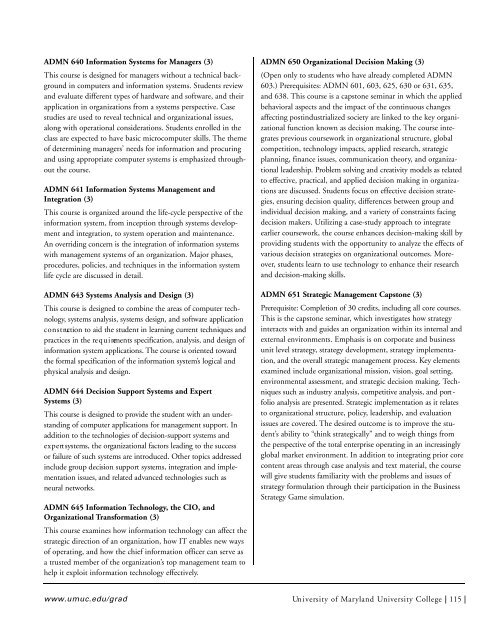A+B. Intro_SJ.1 - University of Maryland University College
A+B. Intro_SJ.1 - University of Maryland University College
A+B. Intro_SJ.1 - University of Maryland University College
You also want an ePaper? Increase the reach of your titles
YUMPU automatically turns print PDFs into web optimized ePapers that Google loves.
ADMN 640 Information Systems for Managers (3)<br />
This course is designed for managers without a technical background<br />
in computers and information systems. Students review<br />
and evaluate different types <strong>of</strong> hardware and s<strong>of</strong>tware, and their<br />
application in organizations from a systems perspective. Case<br />
studies are used to reveal technical and organizational issues,<br />
along with operational considerations. Students enrolled in the<br />
class are expected to have basic microcomputer skills. The theme<br />
<strong>of</strong> determining managers’ needs for information and procuring<br />
and using appropriate computer systems is emphasized throughout<br />
the course.<br />
ADMN 641 Information Systems Management and<br />
Integration (3)<br />
This course is organized around the life-cycle perspective <strong>of</strong> the<br />
information system, from inception through systems development<br />
and integration, to system operation and maintenance.<br />
An overriding concern is the integration <strong>of</strong> information systems<br />
with management systems <strong>of</strong> an organization. Major phases,<br />
procedures, policies, and techniques in the information system<br />
life cycle are discussed in detail.<br />
ADMN 643 Systems Analysis and Design (3)<br />
This course is designed to combine the areas <strong>of</strong> computer techn<br />
o l o g y, systems analysis, systems design, and s<strong>of</strong>tware application<br />
c o n s t ruction to aid the student in learning current techniques and<br />
practices in the re q u i rements specification, analysis, and design <strong>of</strong><br />
information system applications. The course is oriented tow a rd<br />
the formal specification <strong>of</strong> the information system’s logical and<br />
physical analysis and design.<br />
ADMN 644 Decision Support Systems and Expert<br />
Systems (3)<br />
This course is designed to provide the student with an understanding<br />
<strong>of</strong> computer applications for management support. In<br />
addition to the technologies <strong>of</strong> decision-support systems and<br />
e x p e rt systems, the organizational factors leading to the success<br />
or failure <strong>of</strong> such systems are introduced. Other topics addre s s e d<br />
include group decision support systems, integration and implementation<br />
issues, and related advanced technologies such as<br />
neural networks.<br />
ADMN 645 Information Technology, the CIO, and<br />
Organizational Transformation (3)<br />
This course examines how information technology can affect the<br />
strategic direction <strong>of</strong> an organization, how IT enables new ways<br />
<strong>of</strong> operating, and how the chief information <strong>of</strong>ficer can serve as<br />
a trusted member <strong>of</strong> the organization’s top management team to<br />
help it exploit information technology effectively.<br />
ADMN 650 Organizational Decision Making (3)<br />
(Open only to students who have already completed ADMN<br />
603.) Prerequisites: ADMN 601, 603, 625, 630 or 631, 635,<br />
and 638. This course is a capstone seminar in which the applied<br />
behavioral aspects and the impact <strong>of</strong> the continuous changes<br />
affecting postindustrialized society are linked to the key organizational<br />
function known as decision making. The course integrates<br />
previous coursework in organizational structure, global<br />
competition, technology impacts, applied research, strategic<br />
planning, finance issues, communication theory, and organizational<br />
leadership. Problem solving and creativity models as re l a t e d<br />
to effective, practical, and applied decision making in organizations<br />
are discussed. Students focus on effective decision strategies,<br />
ensuring decision quality, differences between group and<br />
individual decision making, and a variety <strong>of</strong> constraints facing<br />
decision makers. Utilizing a case-study approach to integrate<br />
earlier coursework, the course enhances decision-making skill by<br />
providing students with the opportunity to analyze the effects <strong>of</strong><br />
various decision strategies on organizational outcomes. Moreover,<br />
students learn to use technology to enhance their research<br />
and decision-making skills.<br />
ADMN 651 Strategic Management Capstone (3)<br />
Pre requisite: Completion <strong>of</strong> 30 credits, including all core courses.<br />
This is the capstone seminar, which investigates how strategy<br />
interacts with and guides an organization within its internal and<br />
external environments. Emphasis is on corporate and business<br />
unit level strategy, strategy development, strategy implementation,<br />
and the overall strategic management process. Key elements<br />
examined include organizational mission, vision, goal setting,<br />
environmental assessment, and strategic decision making. Techniques<br />
such as industry analysis, competitive analysis, and port -<br />
folio analysis are presented. Strategic implementation as it re l a t e s<br />
to organizational structure, policy, leadership, and evaluation<br />
issues are covered. The desired outcome is to improve the student’s<br />
ability to “think strategically” and to weigh things from<br />
the perspective <strong>of</strong> the total enterprise operating in an incre a s i n g l y<br />
global market environment. In addition to integrating prior core<br />
content areas through case analysis and text material, the course<br />
will give students familiarity with the problems and issues <strong>of</strong><br />
strategy formulation through their participation in the Business<br />
Strategy Game simulation.<br />
w w w. u m u c . e d u / g r a d<br />
Un i versity <strong>of</strong> Ma r yland Un i versity <strong>College</strong> | 115 |

















